Melbourne mechanic suffers stroke two days after Pfizer vaccine, doctors say ‘cause unknown’
A “fit and healthy” mechanic says his life has been turned “upside down” since suffering a stroke two days after his second Pfizer shot.

A “fit and healthy” car mechanic who got vaccinated to keep his job says his life has been turned “upside down” since suffering a stroke two days after his second Pfizer shot.
Melbourne man Peter Lee, 36, is now in financial hardship and says he feels abandoned by the government.
Australia’s medicines regulator, the Therapeutic Goods Administration (TGA), does not currently recognise stroke as a known side effect of the Pfizer vaccine.
“I was given a date until the end of November – if you’re not vaccinated then you won’t be able to work,” he said.
“Now everyone’s saying, ‘We don’t know what’s causing it so we can’t really do anything for you.’”

Mr Lee and his wife have applied for financial assistance, and he has registered with the federal government’s Covid-19 vaccine claims scheme, which is still in development.
But it’s not clear whether he will be eligible – according to the Health Department’s website, the scheme will cover the cost of injuries associated with “recognised side effects” of the Pfizer and AstraZeneca Covid-19 vaccines listed in their product information sheets.
A spokeswoman for the Health Department confirmed that stroke was “not a recognised adverse event”, and warned linking vaccination to a reaction purely based on “temporal association” was “misleading”.
However, a large study from the UK in August did find an increased risk of stroke associated with Pfizer.
“The TGA is aware of the study referred to and is considering it as part of our ongoing safety monitoring of Covid vaccines,” the spokeswoman said.
She said people were encouraged to report suspected adverse events following vaccination.
“This provides valuable data that helps us identify potential safety issues and, where appropriate, take regulatory action such as including new safety concerns in the product information,” she said.
But she stressed that “large-scale vaccination means that some people will experience a new illness within a few days or weeks of vaccination”.
“These events are often coincidental, rather than being caused by the vaccine, therefore any attempts to link the two based on a temporal association alone is misleading,” she said.


‘Just take Panadol’
Mr Lee received his second dose on October 7.
Soon afterwards he developed a “massive headache”, but was told by staff at the vaccine clinic to “just take some Panadol”.
Two days later, while out walking with his family in Box Hill Gardens on his son’s second birthday, he collapsed.
“All of a sudden I just lost balance,” he said.
“I was paralysed on my left side of my body and was unable to walk.”
He was rushed to Box Hill Hospital where he was diagnosed with stroke on his right brain capsule due to blood clots.
Mr Lee spent two weeks in hospital and rehab – where he was prevented from seeing his family due to Covid-19 restrictions – and still requires assistance from his wife with day-to-day activities such as showering and getting dressed.
In one selfie from hospital he smiles as he raises his left hand.
“I was able to lift my left arm for first time since the stroke,” he said. “I had to smile to show my wife that I was getting better.”
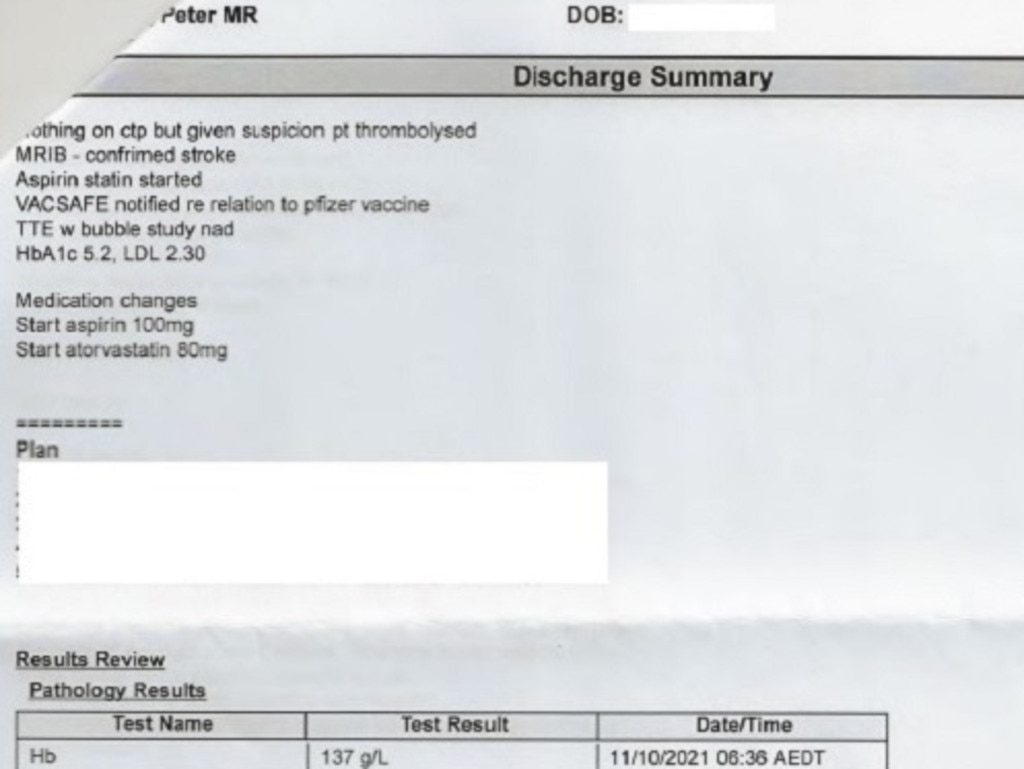
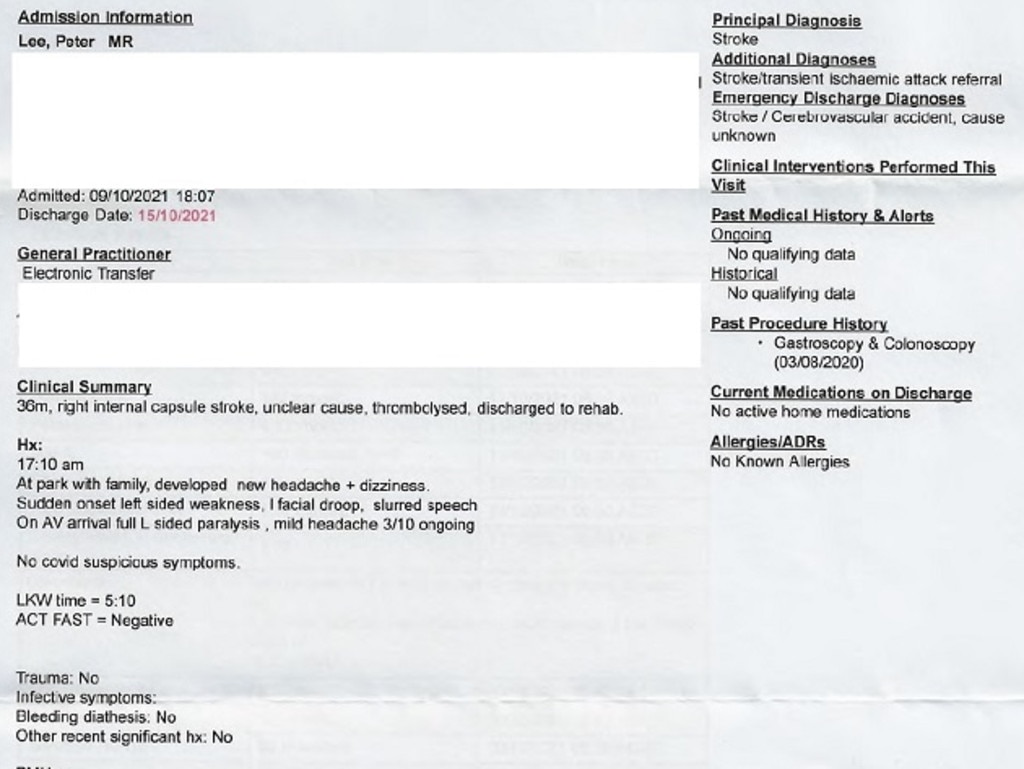
Mr Lee, who has no family history of stroke and no previous medical issues, says he is “really angry” that his doctors refused to link his stroke to the vaccine, despite reporting it to Victoria’s SAFEVAC surveillance service.
“VACSAFE notified re: relation to Pfizer vaccine,” his hospital notes read.
His discharge summary lists the diagnosis as “stroke/cerebrovascular accident, cause unknown”.
“I’m really angry about it, obviously,” Mr Lee said.
“You get the sense they’re trying to hide something, you know? You can tell just from their behaviour, the way they’re speaking – if anyone mentions the vaccine, straight away, ‘No, no, no, it’s very rare.’ They just don’t want to talk about it.”
Mr Lee says hospital staff would only insist that “if it’s blood clot issues it’s more like AstraZeneca” and that “Pfizer has more side effects on your heart”.
“Then I asked them again, ‘Are you 100 per cent sure it’s got nothing to do with Pfizer?’” he said.
“They were saying, ‘We can’t really say because we don’t know what caused the stroke.’ They didn’t want to link it to the vaccine at all. My blood pressure was OK, my cholesterol was OK, I don’t have diabetes, all of the numbers from the charts were within normal range. They just said that in 20 per cent of stroke patients the cause is unknown. They let me go with ‘unknown cause’.”
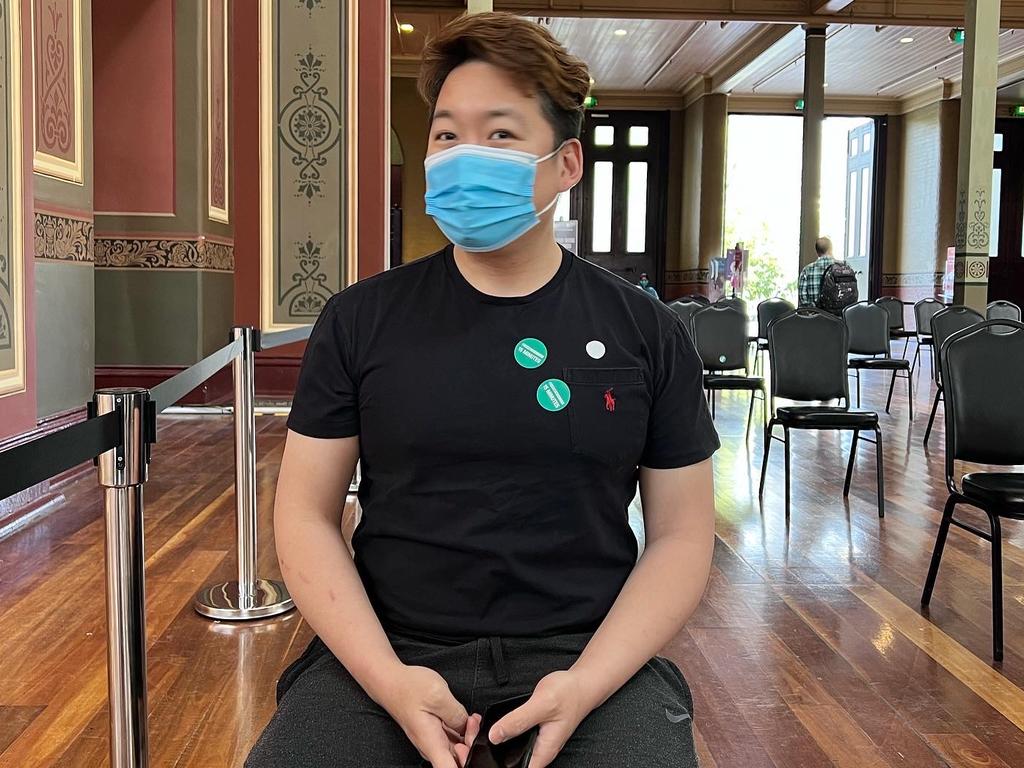
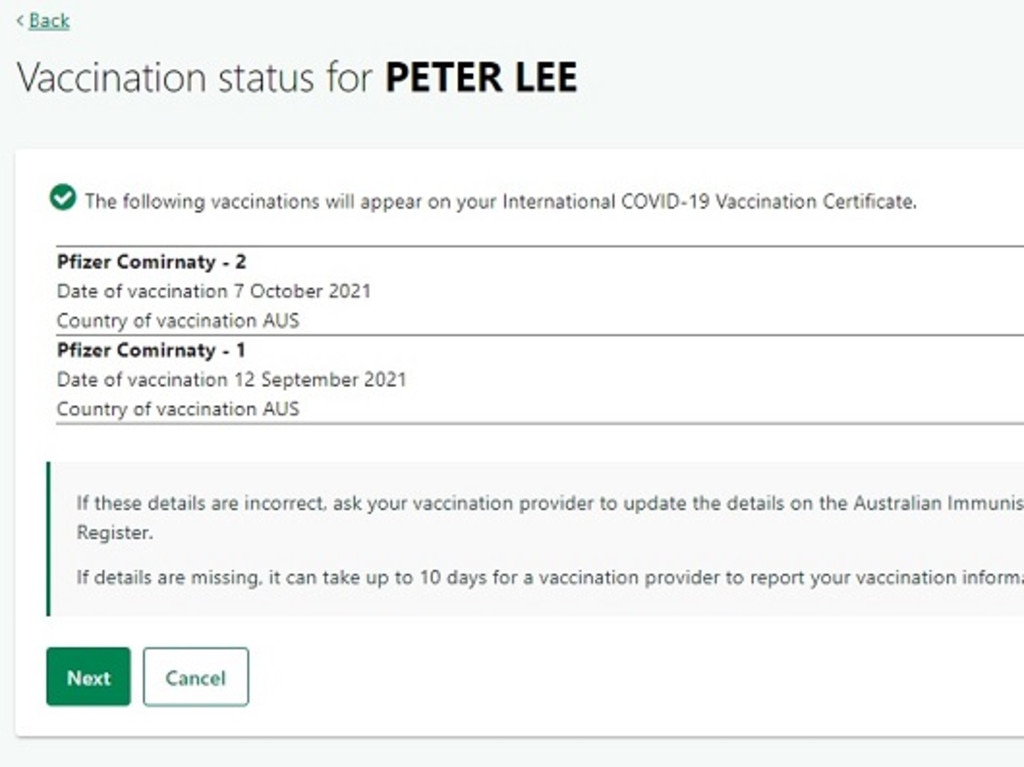
SAFEVAC reports are forwarded to the TGA, however Mr Lee says they have had no follow-up or answers despite also lodging their own report with the TGA on October 18.
“We tried to speak to Centrelink, the TGA and other government agencies but they have done nothing to help us,” he said.
“My wife was trying to call all different agencies – the Health Department, VACSAFE, pretty much anything related to Covid vaccination. All they would say is, ‘We’re so sorry to hear that but we’ve never heard this kind of report.’”
Mr Lee “fortunately” still has his job but hasn’t had any pay since October.
His wife, who works as a hairdresser, has also been unable to earn any money as she has to care for her husband and their son.
“At the moment we’re in financial difficulty,” he said.
“I just want to be recovered so I can get back to work. That’s my goal for now. Maybe compensation in the future, if they decide to do something about it. But at the moment, I just want to know what caused my stroke.”
The Sydney Morning Herald reported on Tuesday that more than 10,000 people had already filed vaccine injury claims.
The Health Department spokeswoman said potential claimants who have registered their interest in the vaccine claims scheme will be notified directly ahead of its opening in December.
“Given the intent to provide a fast administrative solution to provide compensation, it is expected payments will flow shortly after assessments are made,” she said.
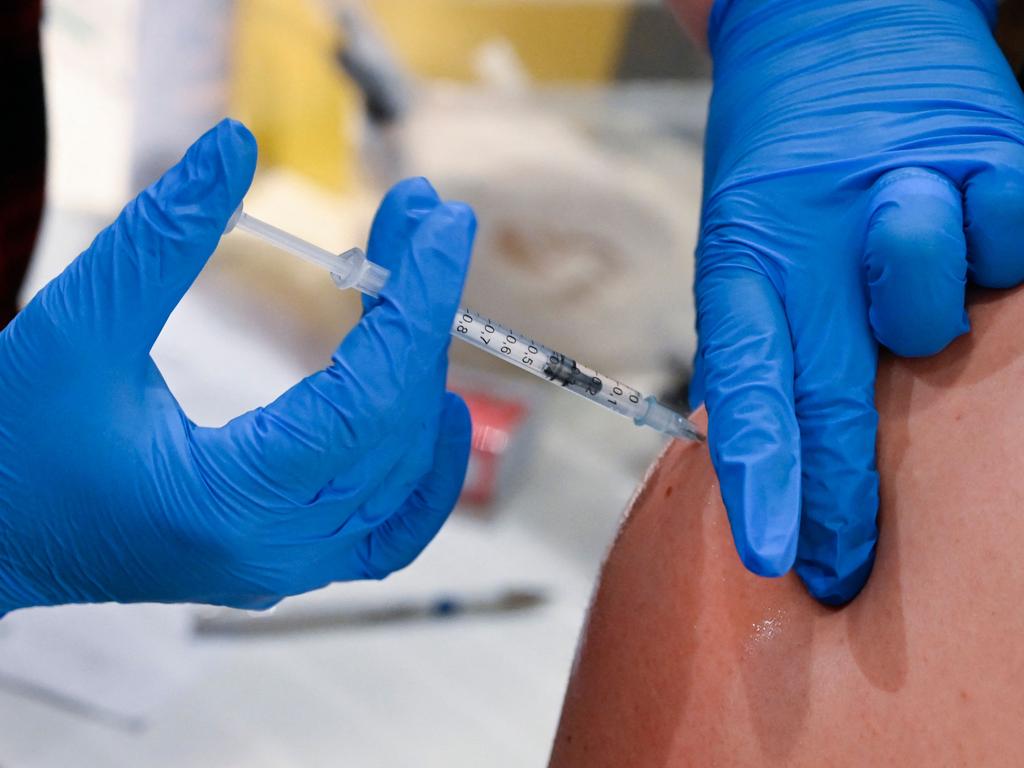
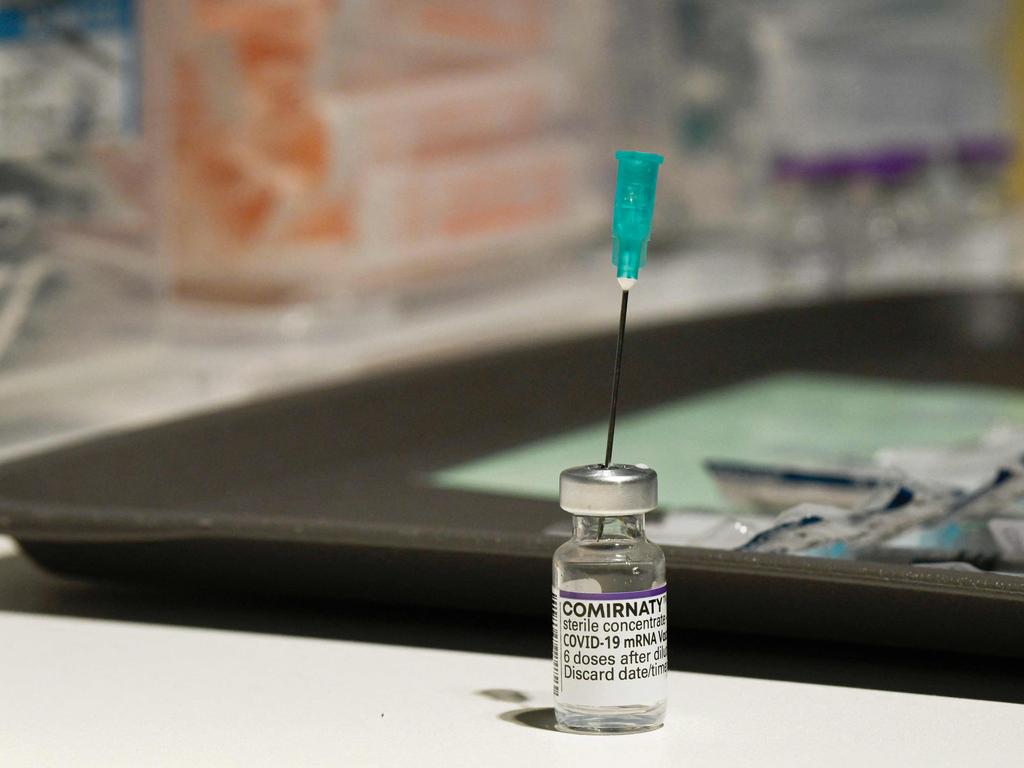
Stroke risk link
In the August study, Pfizer was linked to a slight increase in stroke risk.
Researchers led by a team from the University of Oxford examined records of more than 29 million people who received a first dose of a Covid-19 vaccine between December and April, looking for complications up to 28 days after vaccination.
The study, published in the British Medical Journal, found that for every 10 million people vaccinated with Pfizer, an extra 143 strokes would be seen – a rate of 1.43 per 100,000 people.
However, the study found that the risk of stroke was far higher after Covid-19 infection.
“This new study tells us … the risk of having a stroke due to catching Covid-19 before vaccination is much greater than your risk of stroke from having the vaccine,” Dr Richard Francis, head of research at the UK Stroke Association, told The Herald newspaper.
Pfizer is more commonly associated with rare inflammatory heart conditions.
Myocarditis, or inflammation of the heart, is reported in around one out of every 100,000 people after receiving Pfizer, according to the TGA. It is more common in young men and teenage boys at about four to seven cases per 100,000.
The AstraZeneca vaccine has been linked to a rare but serious blood clotting disorder, thrombosis with thrombocytopenia syndrome (TTS) – characterised by blood clots and low blood platelets – which is reported in about two out of every 100,000 people.
Nine people are confirmed to have died after vaccination in Australia, all after having AstraZeneca.
Eight were TTS cases and one was a case of immune thrombocytopenia (ITP), a type of bleeding disorder linked to low platelets.
Australia is discontinuing the use of AstraZeneca. Under Australia’s booster program which began this month, Pfizer will be used regardless of the vaccine received for the first or second dose.
Last month, 19-year-old equestrian competitor Cienna Knowles blamed the Pfizer vaccine after being hospitalised with blood clots in her chest.
In viral social media posts, the Central Coast teen said she had been diagnosed with portal vein thrombosis (PVT) – blood clot of the portal vein, which allows blood to flow from the intestines to the liver.
At the time, NSW Health officials played down her claims while urging the public to “use trusted and credible sources of information”.
Meanwhile, a spokeswoman for the TGA said PVT was “not a recognised side effect” of Pfizer and suggested it may be a “coincidence”.
“It is important to note that the reporting of an adverse event to the TGA does not mean that the event was caused by the vaccine,” she said.
“There might be no relationship between the adverse event and the vaccine – it may be a coincidence that the adverse event occurred when the vaccine was administered.”






